|
The Hellenic Genocide
Quotes from historical documents and related Photos. |
|||
CHAPTER XVI: "As the looting spread and the killing increased the American institutions were filled with frightened people. These institutions in Smyrna were the Intercollegiate Institute, a seminary for young girls; the Y. W. C. A., housed in a large building and surrounded by a garden and tennis court, and the Y. M. C. A. The night of the tenth the shooting could still be heard in the Christian quarters and frightened people were besieging the doors of these institutions and screaming and begging in Godís name to be let in." CHAPTER XVI: "The following is found in my memoranda dated September 12, 1922: "A party of Americans saw nine cartloads of dead bodies being carried off in the neighborhood of the Konak (Turkish government house) and another party saw three such cart-loads in the neighborhood of the Point Station." Captain Hepburn, one of the naval officers, counted thirty-five dead bodies on the road leading to Paradise, a small village near Smyrna, where the American International College is situated." CHAPTER XVI: "The tales vary as to the manner of Chrysostomís death, but the evidence is conclusive that he met his end at the hands of the Ottoman populace. A Turkish officer and two soldiers went to the offices of the cathedral and took him to Nureddin Pasha, the Turkish commander-in-chief, who is said to have adopted the medieval plan of turning him over to the fanatical mob to work its will upon him. There is not sufficient proof of the veracity of this statement, but it is certain that he was killed by the mob. He was spit upon, his beard torn out by the roots, beaten, stabbed to death and then dragged about the streets." CHAPTER XVI: "Looking from the door of the Consulate, I saw a number of miserable refugees with their children, bundles and sick, being herded toward the quay by several Turkish soldiers. One gray-haired old woman was stumbling along behind, so weak that she could not keep up, and a Turkish soldier was prodding her in the back with the butt of his musket. At last he struck her such a violent blow between the shoulder-blades that she fell sprawling upon her face on the stony street. Another old woman came screaming to me, crazy with grief, crying, "My boy! My boy!" The front of her dress was covered with blood. She did not say what had happened to her boy, but the copious blood told its own story." CHAPTER XVII: "IT WAS after this complete gutting of the Armenian portion of the town that the Turkish soldiers applied the torch to numerous houses simultaneously. As has already been mentioned, they chose a moment when a strong wind was blowing directly away from the Mohammedan settlement." CHAPTER XVII: "Miss Minnie Mills, its dean, a brave, competent and admirable lady, saw Turkish soldiers go into various Armenian houses with petroleum tins and in each instance after they came out, flames burst forth. In a conversation held with me on the thirtieth of January, 1925, on the occasion of the Missionary Convention that took place in the City of Washington, Miss Mills confirmed the above statements and added the following details: "I could plainly see the Turks carrying the tins of petroleum into the houses, from which, in each instance, fire burst forth immediately afterward. There was not an Armenian in sight, the only persons visible being Turkish soldiers of the regular army in smart uniforms."" CHAPTER XVII: "On the same occasion Mrs. King Birge, wife of an American missionary to Turkey, made the following statement: "I went up into the tower of the American College at Paradise, and, with a pair of field-glasses, could plainly see Turkish soldiers setting fire to houses. I could see Turks lurking in the fields, shooting at Christians. When I drove down to Smyrna from Paradise to Athens, there were dead bodies all along the road."" CHAPTER XVII: "During the same conversation Miss Mills told me of a great throng of Christians crowded into a street the head of which was guarded by Turkish soldiers. The flames were approaching and the soldiers were forcing these people to go into the houses. An American automobile passed and the poor wretches stretched out their hands, crying: "Save us! The Turks are going to burn us alive." Nothing could be done, of course, and the car passed on. Later two Catholic priests came up and said to the Turks, "This is a fiendish thing you are doing," and they allowed an old woman to come out of one of the houses." CHAPTER XVII: ""All ovens in the Christian quarters, where we were, at least, and probably everywhere, had been ordered closed from Sunday until Wednesday, when the city burned. It looks now to me like a definite attempt to starve the population out." "The Red Cross insisted on ovens being opened for them and the people were then burned out."" The Hellenic Genocide Quotes from historical documents and related Photos. Previous page | Initial page | Site Map | Next page (22th of 29) |
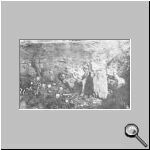
Soldiers pose next to bones.
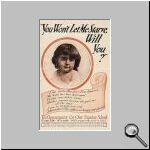
"You Won't Let Me Starve, Will You?"
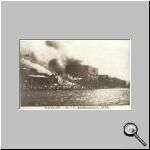
Buildings on fire at the quay of Smyrna.
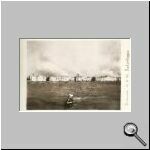
Buildings on fire in Smyrna and rescue boats.
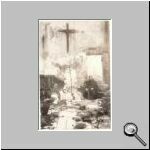
The cemetery of Saint Mary in Smyrna.
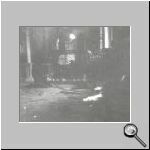
Destruction of the interior of Church of Zoodochos.
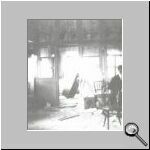
The destroyed office of the Church of Evangelistrias.
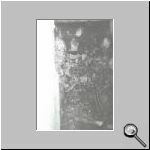
Interior view of the grave and bones of Konstantios I.
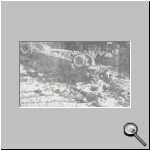
Cars of Hellenes and goods of Hellenic shops destroyed.
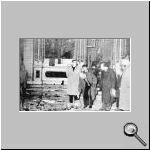
Inspection of the interior of a destroyed church.